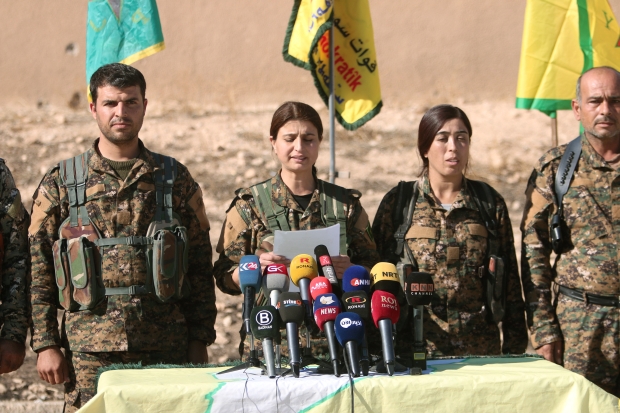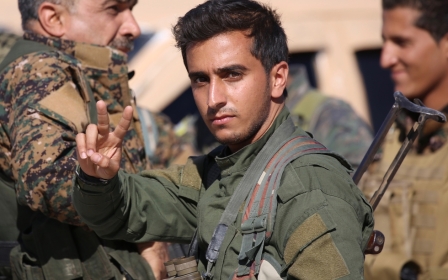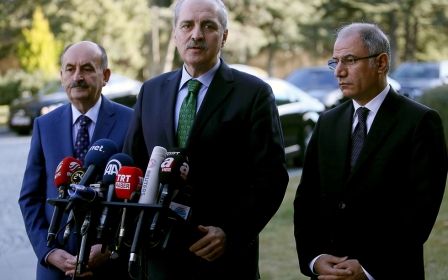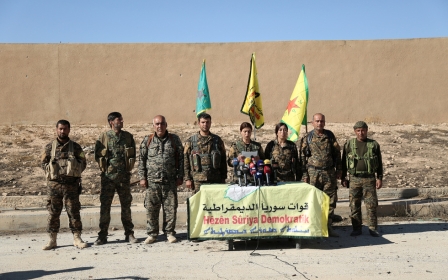Raqqa: Syrian Arab fighters pull out of Kurd-led offensive
The Syrian Arab component of forces attacking Raqqa have withdrawn from operations, declaring Kurdish forces had broken an agreement to allow them to lead the charge into the Islamic State (IS) group-held city.
In a statement released only days after the "Euphrate's Wrath" offensive began, Liwa Thuaar Raqqa (Raqqa revolutionary brigade) said it would no longer fight alongside the Kurdish YPG militia.
The brigade accused the US of trying to "sideline" its men in favour of the Kurdish forces, placing pressure on the YPG's backers in Washington who had pledged to let Arab forces take the lead in the operations.
Liwa Thuaar's political office leader, Mahmoud Hadi, said: "The brigade refused to participate in the operation because the YPG did not keep to what we had agreed – that the battle be led by the brigade and that the fighters all come from Raqqa itself.”
"The agreement was that the SDF would only provide logistical support for the operation," he added."Everything had been agreed beforehand, we even agreed which flags would be raised... and that the brigade would be in charge of the administrative and security management of the city afterwards.
"But what happened on the ground has unfortunately been the complete opposite to what we had agreed."
The brigade said it was the only Arab component of the operation.
Hadi said his brigade was still committed to its goals of retaking Raqqa, that the operation would be long and that the "sons of Raqqa" were the only ones capable of winning this battle and freeing the people from IS.
"There are internal divisions within the SDF and pressures on the YPG from the international coalition, specifically the US, to sideline the brigade," said Hadi. However, he added that his men were not pulling out of the wider SDF coalition.
Turkey has previously expressed alarm that the SDF is dominated by the YPG, and an influx of Kurds into Raqqa would change its demographics.
Ankara considers the YPG an extension of the Kurdistan Workers' Party (PKK), which it considers a terrorist group.
It has vowed to fight it in northern Syria, and warned it could act if Raqqa, an Arab-majority city, is taken by Kurdish forces.
The Turkish deputy prime minister, Numan Kurtulmus, said Raqqa "belonged to the people" who lived there before the conflict erupted.
"Changing the demographic structure will in no way make any contribution to making peace," he said earlier this week.
"Legitimacy is not provided by armed terrorist groups. I think in the end the United States will have to understand this.
"Every step taken by non-Arab elements is not in the interests of the United States."
The US general, Joseph Dunford, said earlier this week that he did not think the YPG would be involved in the direct capture of the town, but only in its isolation, a process that he said could take months.
"We always knew the SDF wasn’t the solution for holding and governing Raqqa. What we are working on right now is to find the right mix of forces for the operation."
He also suggested Turkish views would be taken into account before any final assault.
"The coalition and Turkey will work together on the long-term plan for seizing, holding and governing Raqqa," Dunford said.
Middle East Eye propose une couverture et une analyse indépendantes et incomparables du Moyen-Orient, de l’Afrique du Nord et d’autres régions du monde. Pour en savoir plus sur la reprise de ce contenu et les frais qui s’appliquent, veuillez remplir ce formulaire [en anglais]. Pour en savoir plus sur MEE, cliquez ici [en anglais].






